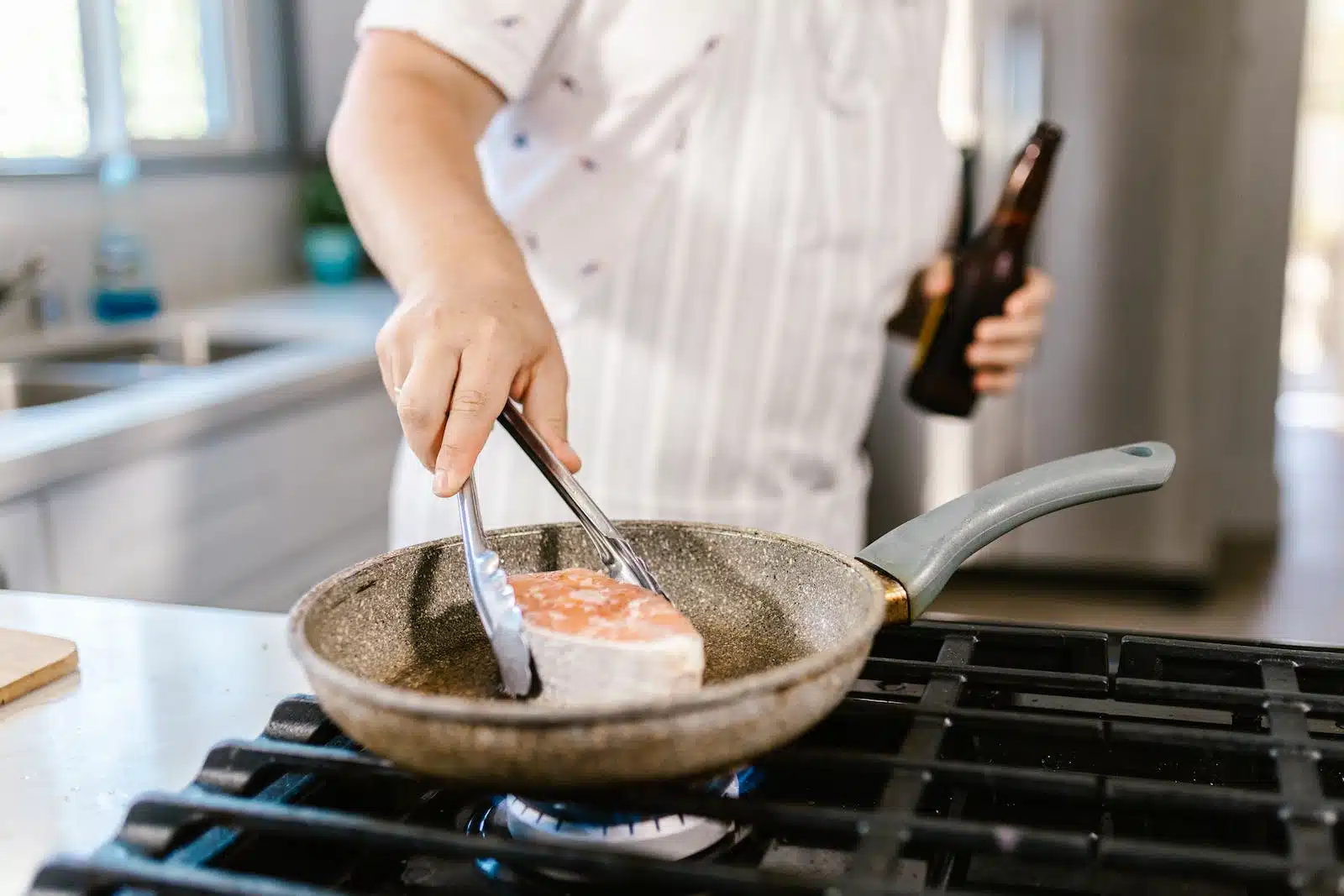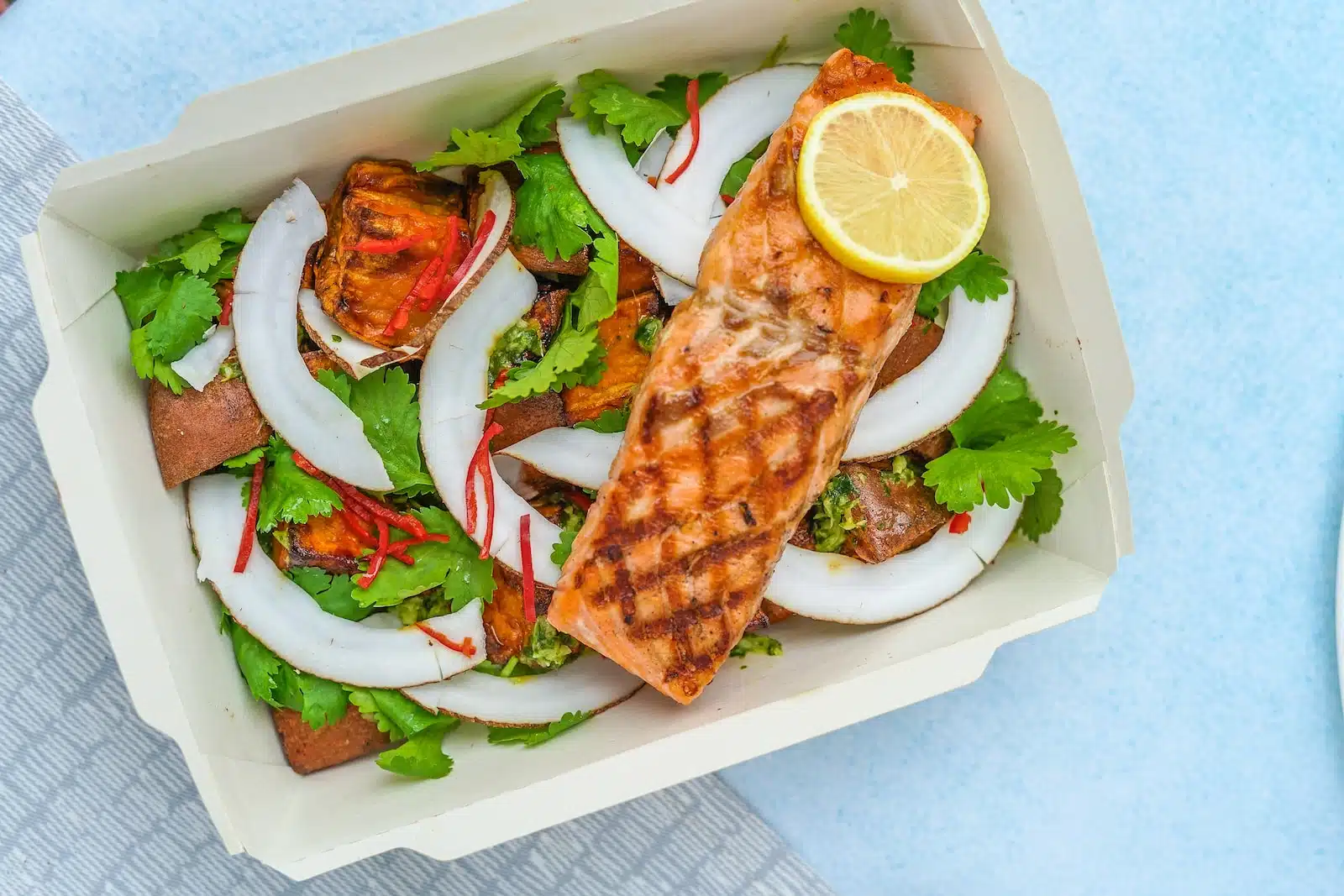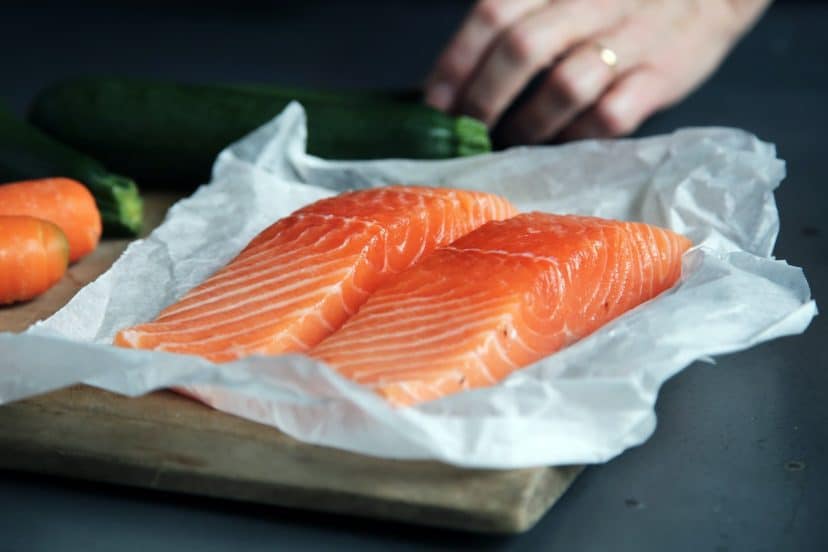How Long to Bake Salmon at 450? My Oven Baked Salmon Recipe
Opening my oven to the savory aroma of perfectly baked salmon is one of the simple joys in my kitchen. Baking salmon at a fiery 450 degrees Fahrenheit transforms it from plain to extraordinary. Wanna learn how to bake salmon at 450? Keep reading!
In our busy lives, we crave meals that are quick yet delightful, and a hot oven ensures your fish cooks fast, locking in moisture for tenderness. As we explore this technique together, we will cover the steps I take to bake juicy salmon fillets and answer some common questions like serving suggestions or checking if your salmon’s done even without fancy tools.
Chances are you’ve tried various methods with different results, but stick with me; Whether wrapped snugly in foil for flavor infusions or given a crispy edge on parchment paper, we’ll go through each method so you can choose what suits your taste buds best.
Don’t forget about choosing the right seasonings and marinades—they make all the difference! And when it comes time to serve up this delectable dish, I’ve got some recommendations that will round out your meal beautifully.
You’re now set to start an oven-baked adventure that promises simplicity yet delivers big on flavor. Let’s get those ovens preheated!
Table of Contents
- 1 Key Takeaways
- 2 Benefits of Baking Salmon at 450 F
- 3 Steps to Baking Salmon at 450 F
- 4 Different Methods for Baking Frozen Salmon at 450 F
- 5 Tips for Perfectly Baking Salmon at 450 F
- 6 Serving Suggestions
- 7 FAQs
- 7.1 How long should I bake salmon in the oven at 450 degrees?
- 7.2 What temperature shows that my baked salmon is done?
- 7.3 Can I cook my salmon wrapped in foil in the oven?
- 7.4 What’s a good Oven Baked Salmon Recipe to try?
- 7.5 Is there anything special I need to do when preparing my Salmon for the oven?
- 8 Conclusion
Key Takeaways
- Baking salmon at 450 F for 12–15 minutes results in a dish that is tender, juicy, and quickly cooked.
- Seasonings, marinades, and toppings like herbs, lemon juice, or breadcrumbs add extra flavor to the salmon.
- Properly checking for doneness with a food thermometer ensures the internal temperature reaches 140°F or flake testing if you don’t have one.
- Various methods, like baking on a lined sheet, wrapping in foil, or using an air fryer, offer different ways to cook salmon at high temperatures.
- Serve baked salmon with sides such as roasted vegetables or garlic mashed potatoes for a complete meal.
Benefits of Baking Salmon at 450 F

Baking frozen salmon at 450 F offers the benefits of a quick cooking time, resulting in a tender and juicy texture, and it’s versatile for different recipes.
Quick Cooking Time
I love that baking salmon at 450 degrees means I don’t have to wait long for a delicious meal. In just 12 to 15 minutes, the oven does its magic, cooking the fish quickly and evenly.
This rapid bake time is perfect for busy evenings when I want a nutritious dinner without spending hours in the kitchen.
Before popping it in the oven, I always ensure my salmon is dry and ready on a lined baking sheet. No flipping or fussing is required; as it cooks, I can focus on whipping up sides or even setting a beautiful table.
And if thicker cuts are on the menu, checking doneness at around 15 minutes lets me serve up a dish that’s perfectly cooked every single time.
Tender and Juicy Texture
The high temperature of 450 degrees F ensures that the salmon is cooked quickly, resulting in a tender and juicy texture. The intense heat caramelizes the surface of the fish, sealing in moisture and flavor while creating a deliciously flaky interior.
This method also helps to retain the natural oils present in the salmon, making it succulent and rich in taste.
Baking at 450 degrees F gives the salmon an irresistible texture that is both tender and juicy, elevating its overall appeal. The quick cooking time minimizes moisture loss, preserving the delicate nature of the fish.
Versatile for Different Recipes
Salmon baked at 450 degrees Fahrenheit is versatile for different recipes. It can be enjoyed as a stand-alone dish or used in salads, pasta, or sandwiches. The high cooking temperature quickly locks in the salmon’s natural flavors and moisture, making it ideal for a wide range of culinary creations.
Additionally, the tender texture of oven-baked salmon at 450 degrees makes it suitable for various cuisines, from Asian-inspired dishes to Mediterranean flavors.
Its versatility extends to being paired with different sauces and seasonings like citrus-infused marinades, herb butter, or tangy glazes—adding depth and variety to your menu options while keeping the cooking process simple and efficient.
Steps to Baking Salmon at 450 F

Preheat the oven to 450 F and prepare seasoned salmon fillets for baking. I recommend thawing salmon overnight for the best taste. Place the salmon on a lined baking sheet and bake for 12–15 minutes until it reaches an internal temperature of 145 F.
Then, check for doneness before serving.
Preheat the Oven and Prepare the Salmon
To ensure the oven is ready for baking, preheat it to 450 degrees F. While the oven is preheating, prepare the salmon by seasoning it with your preferred herbs, spices, and marinades. As an alternative method, you can also add a squeeze of lemon juice or a drizzle of olive oil to enhance the flavor. Once the salmon is seasoned, place it skin-side down on a foil-lined baking pan or a prepared baking sheet.
- Place the seasoned salmon on a lined baking sheet or foil-lined pan.
- Ensure the oven is preheated to 450 degrees F before placing the salmon inside.
- Season the salmon with your favorite herbs and spices for extra flavor.
Place Salmon on A Lined Baking Sheet
After preheating the oven to 450 degrees F and preparing the salmon, carefully place the seasoned salmon fillets onto a lined baking sheet. Ensure that there is enough space between each fillet to allow for even cooking. This step is crucial for achieving a nicely roasted exterior and tender interior of the salmon.
Additionally, placing the salmon on a lined baking sheet makes cleanup easier and prevents sticking during cooking. Once it’s positioned on the baking sheet, it’s ready to be baked to perfection.
Bake Salmon for 12-15 Minutes
I preheat the oven to 450 degrees F before baking the salmon. The recommended baking time for the salmon at this high temperature is between 12 to 15 minutes, depending on the thickness of the fillet. Once done, I take it out and check that its internal temperature is at least 140°F to ensure it’s properly cooked.
Another variation I sometimes use is cooking the salmon until it reaches an internal temperature of 135°F for a slightly different texture. This recipe can be served with a Toasted Almond Parsley Salad and squash, if desired. Additionally, the salmon can also be cooked in foil for added flavor and moisture.
Check for doneness
Once the salmon has baked for 12-15 minutes, it’s important to ensure that it’s cooked to perfection. Check its skin side. Here are some key ways to check if your salmon is done:
- Use a food thermometer to check the internal temperature of the salmon. It should reach 140°F for doneness.
- Gently press the top of the salmon with a fork or your finger; it should flake easily and appear opaque throughout.
- Look for whitish or beige coagulated protein on the surface of the fish, which indicates it’s fully cooked.
- Another method is to insert a knife into the thickest part of the fish and hold it there for 5 seconds, then touch it to your lower lip. If it’s warm, your salmon is ready to be served!
- If you prefer your salmon slightly undercooked, aim for an internal temperature of 135°F.
Different Methods for Baking Frozen Salmon at 450 F

In addition to baking salmon in the oven, there are other methods to consider, such as using a grill, an air fryer, or wrapping it in foil. Each method offers a unique way to cook salmon at 450 F, so you can choose the one that best suits your preferences and kitchen equipment.
In the Oven
Preheat the oven to 450 degrees Fahrenheit before placing the salmon on a lined baking sheet. Ensure that the salmon is dry and seasoned, then lay it skin-side down for even cooking.
Bake the salmon for 12–15 minutes until it reaches an internal temperature of 140°F, ensuring a tender and juicy texture. The versatility of this method allows for various seasonings and toppings to be added according to personal preference, resulting in a delicious oven-baked salmon dish.
To add extra flavor and moisture, consider cooking the salmon in foil at 450°F. This not only helps lock in moisture but also infuses the fish with aromatic flavors during baking.
In an Air Fryer
When considering alternative methods for cooking salmon at high temperatures, using an air fryer is a convenient and efficient option. Preparing salmon in an air fryer involves preheating the appliance to 450°F, then placing the seasoned or marinated salmon fillets directly into the basket.
The recommended cooking time for baking salmon in an air fryer at 450°F ranges from 8 to 10 minutes, making it a quick and practical cooking method. Additionally, the air fryer yields a crispy exterior while locking in the moisture, resulting in tender and flavorful salmon fillets.
This method is perfect for individuals seeking a quicker alternative to traditional oven baking while still achieving delicious results.
In Foil
When cooking salmon in foil, I usually lay the salmon fillet skin-side down on a large piece of aluminum foil. Then, I fold up the edges of the foil to create a packet and seal it tightly.
This method helps to lock in moisture and produce a succulent and flavorful result. Additionally, adding herbs, seasonings, or citrus slices inside the foil packet can infuse the salmon with extra aromatic flavors while it bakes.
Remember not to overcook when using this method; check for doneness by carefully opening one edge of the foil packet toward the end of the cooking time.
Tips for Perfectly Baking Salmon at 450 F

To perfectly bake salmon at 450°F, consider using flavorful seasonings and marinades to enhance the taste. Additionally, make sure to properly check for doneness and consider adding toppings for extra flavor.
Seasoning and Marinades
To enhance the flavor of the salmon, I always use a blend of seasoning and marinades before baking. A simple mix of olive oil, minced garlic, lemon juice, salt, and pepper works wonders for adding a burst of savory goodness to the salmon.
The marinade helps to infuse the fish with delicious flavors while also keeping it moist during cooking. Additionally, experimenting with different herbs, like dill or thyme, can take the taste to another level.
I recommend marinating the salmon for at least 30 minutes in the refrigerator before baking. This allows enough time for the flavors to penetrate through the fish thoroughly. The combination of seasoning and marinades not only adds an appetizing aroma but also contributes significantly to elevating the overall dining experience.
Properly Checking for Doneness
After seasoning and marinating the salmon, it’s essential to properly check for doneness before serving. An accurate way to determine if the salmon is fully cooked is by using a food thermometer.
The internal temperature of the thickest part of the salmon should reach 140°F for it to be considered done. Another method is to gently insert a fork or knife into the flesh and twist it slightly; if it flakes easily, then your salmon is ready.
To ensure that your salmon reaches the perfect level of doneness, avoid overcooking, as this can result in dry and tough texture. It’s important to keep an eye on your cooking time and make any necessary adjustments based on the thickness of the fillet.
Adding Toppings for Extra Flavor
I like to add a combination of fresh herbs, such as dill or parsley, along with a squeeze of lemon juice for a burst of freshness. A dollop of creamy dill sauce made with Greek yogurt and some capers also elevates the flavor profile.
Another option is to sprinkle some chopped nuts, such as almonds or pecans, for added crunch and nuttiness. For a hint of sweetness, drizzle some honey or maple syrup over the salmon before baking.
These toppings enhance the natural flavors of the salmon while adding an extra layer of complexity.
To create some contrast in textures, I often add a sprinkle of seasoned breadcrumbs on top before baking for an irresistible crunchy finish. Lastly, for a spicy kick, I sometimes brush the salmon with a thin layer of Sriracha sauce or sprinkle it with red pepper flakes before popping it into the oven.
Serving Suggestions

I will provide suggestions for serving the baked salmon and answer some frequently asked questions about cooking and reheating salmon. If you want to learn more, keep reading.
Reheating Salmon
To reheat the salmon, preheat the oven to 275 degrees F. Place the leftover salmon on a baking sheet lined with parchment paper or aluminum foil before putting it in the oven. Heat for 15 minutes, checking periodically to ensure it’s warmed through but not overcooked.
Alternatively, you can use a microwave by loosely covering the salmon with a damp paper towel and heating it on medium power for about 2 minutes.
For added moisture and flavor when reheating salmon, consider drizzling some olive oil or lemon juice over it before reheating. This can help prevent the fish from becoming dry during reheating while adding a fresh burst of flavor.
Additionally, avoid overheating the salmon during reheating, as this can cause it to become tough and dry. It’s better to slightly underheat and then check if more time is needed rather than risk overcooking your delicious dish.
Side Dish Options
I usually pair my oven-baked salmon with a side of roasted vegetables, like asparagus or Brussels sprouts. The savory flavor of the salmon complements the earthy taste of the roasted veggies really well, and it adds a healthy touch to the meal.
For a heartier option, I love serving the baked salmon with some garlic mashed potatoes. The creamy texture and rich flavor of the potatoes balance out the lightness of the salmon, creating a satisfying and delicious combination.
To add some freshness to the dish, consider serving a simple salad alongside your oven-baked salmon. A mix of mixed greens, cherry tomatoes, and a light vinaigrette can provide a refreshing contrast to the rich flavors of the fish.
How to Know When Salmon Is Done Without A Thermometer?
To know when salmon is done without a thermometer, I usually check for visual cues. When fully cooked, the flesh should be opaque and flake easily with a fork. The color of the salmon will change from translucent to an opaque pink or coral.
Additionally, the internal temperature should register at least 140°F, and the juices should run clear rather than appearing milky. It’s also essential to observe any white protein that oozes out; this indicates it’s time to take the salmon out of the oven.
When determining doneness without a thermometer, remember that thicker cuts may require longer cooking times compared to thinner fillets. Keep in mind that slight translucency in the center is okay if you prefer moist and tender results, but aim for 135°F as an alternative internal temperature indicator.
FAQs
How long should I bake salmon in the oven at 450 degrees?
To get perfectly cooked salmon, bake it in the oven at 450 degrees for about 12–15 minutes.
What temperature shows that my baked salmon is done?
Your salmon is done when it reaches an internal temperature of 145 degrees Fahrenheit, which you can check with a meat thermometer.
Can I cook my salmon wrapped in foil in the oven?
Yes, baking your salmon wrapped in foil helps to keep it moist and flavorful while cooking quickly at high temperatures like 450 degrees.
What’s a good Oven Baked Salmon Recipe to try?
A simple and tasty recipe for oven-baked salmon includes seasoning the fish with salt, pepper, lemon juice, and herbs before baking it for 12-15 minutes at 450 degrees until flaky and tender.
Is there anything special I need to do when preparing my Salmon for the oven?
Just make sure your salmon is patted dry before adding seasonings or marinades; this helps get that deliciously crisp outside as it bakes.
Conclusion
Baking salmon at 450 degrees F offers a quick and delicious way to prepare this nutritious fish. The simple steps and practical tips provided ensure an efficient and consistent cooking experience for anyone.
Have you tried this method? What are your favorite seasonings or toppings for oven-baked salmon? Implementing these strategies can lead to mouthwatering results that elevate your meals.
Explore more seafood recipes to enhance your culinary repertoire and impress your guests with delectable dishes. Embrace the simplicity of oven-baked salmon and enjoy a flavorful, healthy meal with ease.
*We may earn a commission for the purchases made using our links. Please see our disclosure to learn more.




